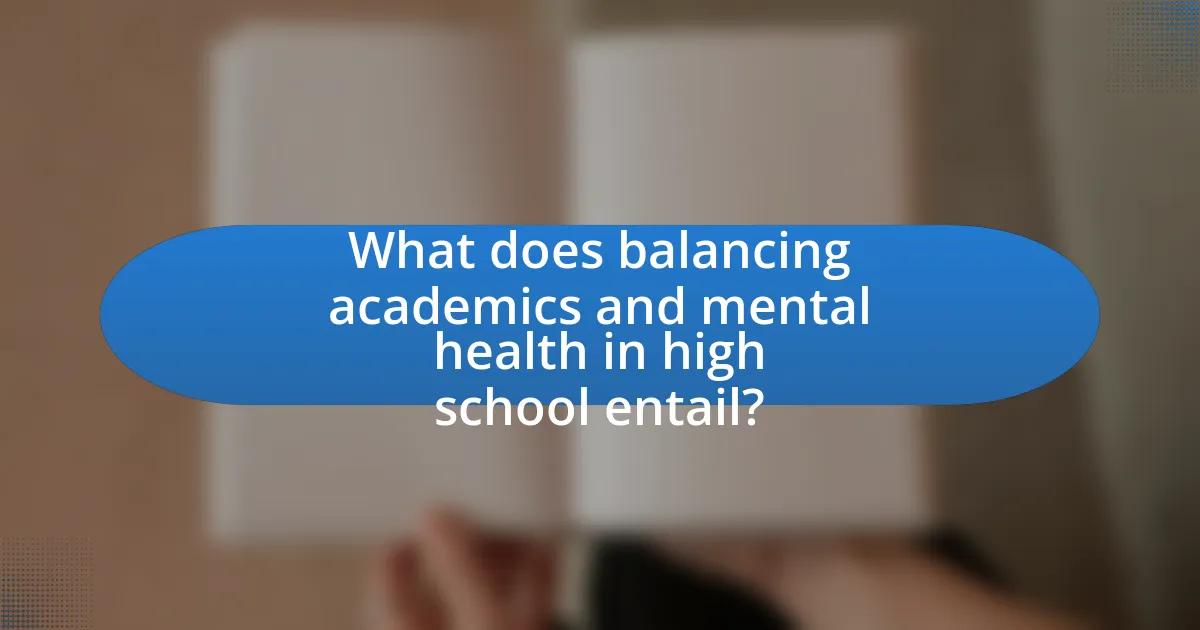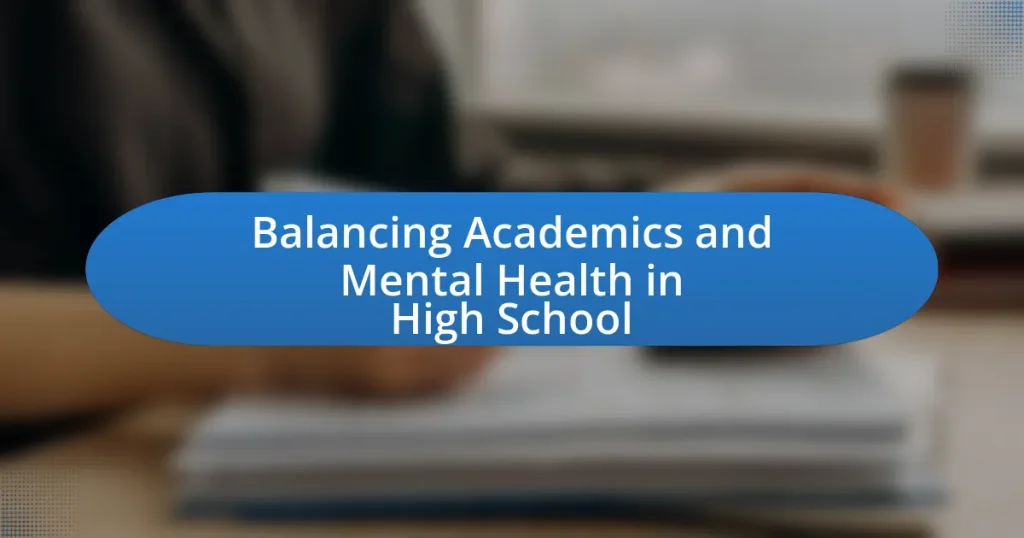Balancing academics and mental health in high school is essential for students to manage their educational responsibilities while ensuring their emotional well-being. This article explores the importance of maintaining this balance, highlighting the consequences of neglecting mental health, such as decreased academic performance and increased anxiety. It discusses the challenges students face, including academic pressure and time management issues, and offers strategies for achieving balance, such as effective study habits and self-care practices. Additionally, the role of schools and parents in supporting students is examined, emphasizing the need for a supportive environment to foster both academic success and mental health.

What does balancing academics and mental health in high school entail?
Balancing academics and mental health in high school entails managing academic responsibilities while prioritizing emotional well-being. This balance requires students to develop effective time management skills, set realistic academic goals, and engage in self-care practices such as regular exercise, adequate sleep, and mindfulness activities. Research indicates that students who maintain a balance between their studies and mental health report lower levels of stress and higher academic performance, as evidenced by a study published in the Journal of Educational Psychology, which found that students with better mental health achieved higher grades.
Why is it important to balance academics and mental health?
Balancing academics and mental health is crucial because it enhances overall well-being and academic performance. When students prioritize mental health, they experience reduced stress and anxiety, which can lead to improved focus and retention of information. Research from the American Psychological Association indicates that students who engage in self-care practices, such as mindfulness and adequate rest, demonstrate higher academic achievement and lower dropout rates. Therefore, maintaining this balance not only supports mental health but also fosters a conducive learning environment, ultimately benefiting students’ educational outcomes.
What are the potential consequences of neglecting mental health in high school?
Neglecting mental health in high school can lead to severe academic and personal consequences. Students may experience decreased academic performance, as mental health issues like anxiety and depression can impair concentration and motivation. Research indicates that approximately 20% of adolescents experience a mental health disorder, which can result in higher dropout rates and lower grades. Additionally, neglecting mental health can lead to social isolation, increased risk of substance abuse, and the development of chronic mental health conditions. A study published in the Journal of Adolescent Health found that students with untreated mental health issues are more likely to engage in risky behaviors, further exacerbating their challenges.
How can academic pressure impact students’ mental well-being?
Academic pressure can significantly impact students’ mental well-being by increasing stress, anxiety, and depression levels. Research indicates that high academic demands can lead to feelings of inadequacy and overwhelm, which are linked to mental health issues. A study published in the Journal of Educational Psychology found that students experiencing high levels of academic stress reported lower life satisfaction and higher rates of anxiety disorders. Furthermore, the American Psychological Association highlights that chronic stress from academic pressure can lead to burnout, affecting both academic performance and overall mental health.
What are the key challenges students face in achieving this balance?
Students face several key challenges in balancing academics and mental health in high school, primarily due to high academic pressure, time management difficulties, and lack of support systems. High academic pressure is evident as students often encounter rigorous coursework and expectations from parents and teachers, leading to stress and anxiety. Time management difficulties arise from juggling multiple responsibilities, including homework, extracurricular activities, and social life, which can overwhelm students and hinder their ability to prioritize mental health. Additionally, a lack of support systems, such as insufficient access to mental health resources or understanding from educators, exacerbates these challenges, making it harder for students to seek help and maintain a healthy balance.
How do time management issues affect students’ mental health?
Time management issues significantly negatively impact students’ mental health by increasing stress and anxiety levels. When students struggle to allocate their time effectively, they often face overwhelming workloads, leading to feelings of inadequacy and burnout. Research indicates that poor time management correlates with higher levels of anxiety and depression among students, as they feel unable to meet academic demands. A study published in the Journal of Educational Psychology found that students with effective time management skills reported lower stress levels and better overall mental health, highlighting the importance of time management in maintaining psychological well-being.
What role does social pressure play in academic performance and mental health?
Social pressure significantly impacts academic performance and mental health by influencing students’ motivation and stress levels. High expectations from peers and society can lead to increased anxiety, which negatively affects concentration and academic outcomes. Research indicates that students experiencing high social pressure are more likely to report symptoms of depression and anxiety, as evidenced by a study published in the Journal of Educational Psychology, which found that 30% of students felt overwhelmed by academic expectations. This correlation highlights the need for supportive environments that mitigate social pressure to enhance both academic success and mental well-being.
What strategies can students use to maintain this balance?
Students can maintain a balance between academics and mental health by implementing effective time management strategies. Prioritizing tasks through the use of planners or digital tools allows students to allocate specific time slots for studying, extracurricular activities, and relaxation. Research indicates that students who utilize structured schedules report lower stress levels and improved academic performance. Additionally, incorporating regular breaks during study sessions enhances focus and reduces burnout, as supported by studies showing that short breaks can increase productivity and retention of information. Engaging in physical activities and mindfulness practices, such as yoga or meditation, further contributes to mental well-being, as these activities have been linked to reduced anxiety and improved mood among high school students.
How can effective study habits contribute to better mental health?
Effective study habits contribute to better mental health by reducing stress and enhancing academic performance. When students adopt structured study routines, they experience less anxiety due to improved time management and preparedness for exams. Research indicates that students who engage in effective study practices, such as spaced repetition and active learning, report lower levels of stress and higher satisfaction with their academic experience. A study published in the Journal of Educational Psychology found that students who utilized effective study strategies had significantly lower anxiety levels and better overall mental well-being compared to those who did not. This correlation highlights the importance of effective study habits in fostering a healthier mental state among high school students.
What techniques can students use to manage stress and anxiety?
Students can manage stress and anxiety through techniques such as mindfulness meditation, regular physical exercise, and effective time management. Mindfulness meditation has been shown to reduce anxiety levels by promoting relaxation and enhancing emotional regulation, as evidenced by a study published in the journal “Psychological Science” which found that participants who practiced mindfulness reported lower stress levels. Regular physical exercise, supported by research from the Mayo Clinic, indicates that physical activity releases endorphins, which improve mood and reduce stress. Additionally, effective time management strategies, such as prioritizing tasks and breaking assignments into smaller steps, can help students feel more in control and less overwhelmed, as highlighted in studies by the American Psychological Association that link organization skills to reduced anxiety.
How can schools support students in balancing academics and mental health?
Schools can support students in balancing academics and mental health by implementing comprehensive mental health programs and promoting a culture of well-being. These programs can include access to school counselors, mental health workshops, and stress management resources, which have been shown to improve students’ emotional well-being and academic performance. Research indicates that schools with integrated mental health services report a 20% decrease in student anxiety levels and a 15% increase in overall academic achievement. By fostering an environment that prioritizes mental health alongside academic success, schools can help students develop coping strategies and resilience, ultimately leading to a healthier balance between their educational responsibilities and mental well-being.
What programs or resources should schools provide?
Schools should provide mental health support programs, academic counseling, and extracurricular activities. Mental health support programs, such as counseling services and workshops, help students manage stress and anxiety, which are prevalent in high school environments. Academic counseling assists students in navigating their educational paths, ensuring they receive guidance on course selection and college readiness. Extracurricular activities, including sports, arts, and clubs, promote social interaction and personal development, contributing to a well-rounded educational experience. Research indicates that schools with comprehensive mental health resources see improved student well-being and academic performance, highlighting the importance of these programs in balancing academics and mental health.
How can teachers and staff create a supportive environment?
Teachers and staff can create a supportive environment by fostering open communication and building strong relationships with students. Establishing trust allows students to feel safe sharing their concerns, which is essential for their mental health. Research indicates that supportive teacher-student relationships positively impact students’ emotional well-being and academic performance (Roorda et al., 2011, Journal of Educational Psychology). Additionally, implementing social-emotional learning programs equips students with skills to manage stress and develop resilience, further enhancing the supportive atmosphere.
What role do parents play in supporting their children’s balance?
Parents play a crucial role in supporting their children’s balance between academics and mental health. They provide emotional support, guidance, and resources that help children manage stress and prioritize well-being alongside academic responsibilities. Research indicates that parental involvement, such as open communication and encouragement, significantly contributes to a child’s ability to cope with academic pressures and maintain mental health. For instance, a study published in the Journal of Adolescence found that adolescents with supportive parents reported lower levels of stress and higher levels of life satisfaction, demonstrating the positive impact of parental support on achieving balance.
How can parents encourage healthy academic habits?
Parents can encourage healthy academic habits by establishing a structured routine that includes designated study times and breaks. Research indicates that students who have a consistent schedule perform better academically, as it helps them manage their time effectively and reduces stress. Additionally, parents should create a supportive environment by providing resources, such as a quiet study space and access to educational materials, which fosters concentration and motivation. Engaging in open communication about academic goals and challenges also promotes a positive attitude towards learning, as studies show that parental involvement is linked to higher academic achievement.
What signs should parents look for to identify mental health issues?
Parents should look for changes in behavior, mood, and academic performance to identify mental health issues in their children. Specific signs include withdrawal from friends and family, significant changes in eating or sleeping patterns, persistent sadness or irritability, and a decline in academic performance. Research indicates that approximately 1 in 5 adolescents experience a mental health disorder, highlighting the importance of early identification. Additionally, the National Institute of Mental Health emphasizes that early intervention can lead to better outcomes, making it crucial for parents to recognize these signs promptly.
What are some practical tips for students to achieve balance?
Students can achieve balance by implementing effective time management, setting realistic goals, and prioritizing self-care. Effective time management involves creating a structured schedule that allocates specific time blocks for studying, extracurricular activities, and relaxation. Research indicates that students who use planners or digital calendars report lower stress levels and improved academic performance. Setting realistic goals helps students focus on achievable tasks, reducing feelings of overwhelm. Additionally, prioritizing self-care activities, such as regular exercise, adequate sleep, and mindfulness practices, has been shown to enhance mental well-being and academic success. Studies demonstrate that students who engage in physical activity experience improved mood and cognitive function, further supporting the need for balance in their lives.
How can students create a balanced schedule that prioritizes both academics and mental health?
Students can create a balanced schedule that prioritizes both academics and mental health by incorporating structured time blocks for studying, breaks, and self-care activities. Research indicates that time management strategies, such as the Pomodoro Technique, which involves focused study sessions followed by short breaks, can enhance productivity while reducing stress. Additionally, allocating specific times for physical activity, social interactions, and relaxation can improve overall well-being. A study published in the Journal of Educational Psychology found that students who engage in regular physical exercise report lower levels of anxiety and higher academic performance. By integrating these elements into their schedules, students can effectively balance their academic responsibilities with their mental health needs.
What self-care practices can students incorporate into their daily routines?
Students can incorporate practices such as regular exercise, mindfulness meditation, and adequate sleep into their daily routines for effective self-care. Regular exercise, even for just 30 minutes a day, has been shown to reduce stress and improve mood, as supported by research from the Mayo Clinic. Mindfulness meditation can enhance focus and emotional regulation, with studies indicating that just 10 minutes of daily practice can lead to significant improvements in mental well-being. Additionally, maintaining a consistent sleep schedule of 7-9 hours per night is crucial, as the National Sleep Foundation highlights that adequate sleep is essential for cognitive function and emotional stability.


